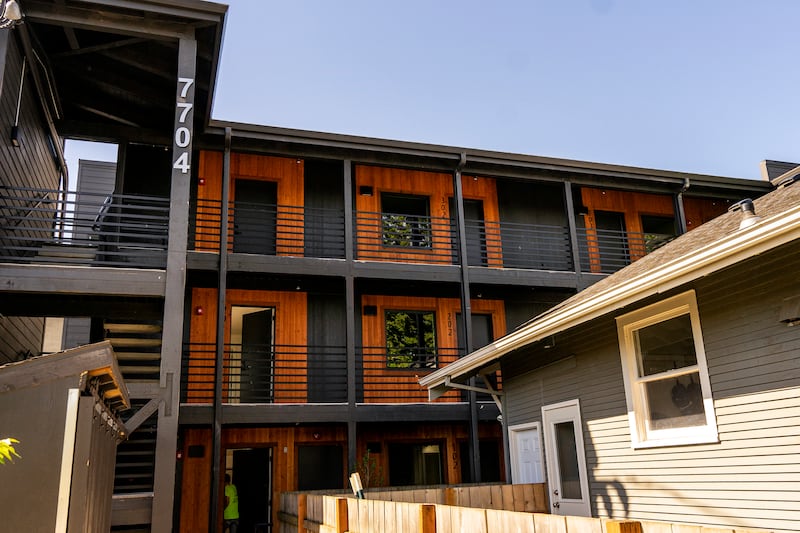The 12-unit complex that Michael Gregory built in the Foster-Powell neighborhood of Southeast Portland is exactly what the city needs to remedy its housing crisis.
The three-story building at 7704 SE Mitchell St. has a mix of studio and one-bedroom apartments, all of which must be sold or rented to lower-income tenants because Gregory got breaks from city fees in return for that promise. The units are spacious, and the kitchens have butcher-block counters.
Too bad Gregory, 40, will never build another complex like it.
“I would rather kick myself in the balls 100 times than do this again,” he says.
Since he bought the land in April 2021, Gregory has been hacking through a thicket of city bureaucracy thornier than the invasive Armenian blackberries that entwined part of the property. Two years later, he’s still awaiting an approval from the Bureau of Development Services, this one for railings along outside walkways.
Gregory is just one of many developers and builders who struggle to get projects approved by the city, a process that involves as many as seven agencies, including the Bureaus of Development Services and Transportation and the parks bureau’s Urban Forestry Division.
“Every bureau in Portland has their hand in the pie,” Gregory says.
To entice frustrated builders like Gregory, City Commissioner Carmen Rubio plans to call on the Portland City Council this week to freeze all system development charges—the one-time fees that pay for things like water mains and streets—for one year. It’s a bold move because the city is strapped, and bureaus funded by SDCs need all the money they can get.
“We are working every angle to find ways to increase housing production,” Rubio says, “but the biggest barriers, such as interest rates, are not within our ability to change.” Freezing SDCs “sends a clear signal that we are serious about increasing the number of homes in Portland.”
Whether the rest of the council agrees with Rubio will say a lot about how eager Mayor Ted Wheeler and the three other commissioners are to support Gov. Tina Kotek’s top priority: building more affordable housing in a state that’s desperate for it. With the state’s biggest city rationing out building permits like bejeweled Fabergé eggs, Kotek is less likely to reach her goal of building 36,000 housing units statewide per year.
Gregory and others still face Soviet-style bureaucracy two years after a 2021 report by the Portland city auditor sounded the alarm on permitting.
“An essential function of Portland’s building permits system does not work as it should,” then-City Auditor Mary Hull Caballero wrote. “City plan reviews of permit applications are too slow, and the city does not follow its own customer complaint policy to resolve these delays.”
The results are in the data. A report by Redfin last July showed Portland’s builders aren’t pulling permits fast enough to meet demand. For single-family houses, builders pulled just 7.6 permits per 10,000 residents in the first quarter of 2022. By contrast, builders in Austin, Texas, took out 31.1 permits per 10,000 residents, leading the nation, according to Redfin.

Rubio wants to get things built. She took over the Bureau of Development Services from Commissioner Dan Ryan in January, and faster permitting is her office’s top priority. Leading the charge is her chief of staff, Jillian Schoene, who is looking for every knob the city can turn to get housing projects permitted and built.
“I will paint apartments,” Schoene says, tongue in cheek.
Rubio directed BDS to halve the fee on “early assistance,” through which a developer can get all city agencies to weigh in on a plan before seeking a permit. Rubio and BDS director Rebecca Esau also put in place a “single point of contact” policy, so developers have one person to deal with, instead of being passed from bureau to bureau.
All of this is too late for Gregory, a crew-cut father of two. A master of sarcasm who’s more likely to laugh at his setbacks than cry, Gregory hoped the project on Mitchell Street would free him from flipping dozens of single-family houses.
“This was supposed to be my exit,” he says. “I was naive.”
The previous owner of the Mitchell Street property said it was almost “shovel ready,” meaning that all the permits were in place. All but one. The architect on the project had one last thing to fix: The Portland Bureau of Transportation wanted him to leave room so it could widen the sidewalks in the future. To do that, Gregory had to move the plumbing for his fire sprinkler system.
Gregory submitted his new plan in May 2021 and waited. And waited.
“I was trying to figure out why I couldn’t give the city its $50,000, get my permit, and start building,” Gregory says. “The city completely shut down [for COVID], and I was stuck with a project that needed about an hour of the building department’s time. No one had a single fuck to give.”
His permit, it turned out, had been misplaced at PBOT. He learned that only because his neighbor worked there. Exasperated, Gregory had knocked on his door.
“Something that should have taken at most two weeks ended up costing me four months,” he says.
In the meantime, lumber prices had soared, and framing studs for the project rocketed from $50,000 to $150,000. He tried to order 12 bathtubs, but vendors just laughed at him. He had to wait 18 months for an electrical panel to come over from China.
When he finally got going, thieves robbed his job site, homeless people smoked meth in his outhouse, and people took dumps on the property. But Gregory is used to that.
“Any project in Portland I figure is going to be robbed at least once, so I just build that into the cost of doing business here,” Gregory says. “No big deal.”
But city bureaucracy is another matter. In May 2021—before the Mitchell building broke him—Gregory paid $440,000 for a bigger, 17,000-square-foot lot on Northeast Killingsworth Street in the Cully neighborhood. He has spent $200,000 developing it. One engineer bid $50,000 to do the sewer and water plans: $25,000 for the plans and $25,000 to get them through permitting.
“To do anything vaguely complicated takes at least two years,” Gregory says. “I have $650,000 in prison.”
Rather than suffer through construction again, Gregory plans to complete the initial permitting process and sell the lot, shovel ready, to another developer.
He has some advice for Schoene: Appoint Diane Parke as head of BDS. Parke runs the bureau’s Field Issuance Remodel program. Once admitted to it, a developer like Gregory gets assigned one inspector who handles all the permits. But the program is only for residential remodels, and there is a waiting list to be a FIR-approved contractor.
“Somebody took everything that sucks about the city of Portland permit system and fixed it,” Gregory says. “If they put Diane Parke in charge of BDS, it might change.”
